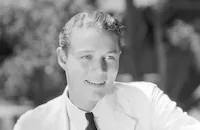Motor Patrol
Cast & Crew
Sam Newfield
Don Castle
Jane Nigh
Bill Henry
Gwen O'connor
Onslow Stevens
Film Details
Technical Specs

Synopsis
When a man's body is found by the side of the road, the apparent victim of a hit-and-run, investigators in the Los Angeles Police Department's Traffic Division go to work. Upon learning that the dead man, Richard Thompson, was a salesman at the Goodwill used car lot, detective Bill Hartley calls on George Miller, owner of the dealership. Miller's secretary, Connie Taylor, turns on the intercom in his office so that she can listen to the interview, then calls Russ Garver at United Garage and arranges to meet him that evening at Hangman's Tree, a café near the spot where Thompson's body was found. Meanwhile, investigator Robert Flynn takes Omar Shelley, the bartender at the café, to the morgue, where he identifies Thompson and says that he saw the dead man arguing with a man and a woman the previous night. That evening, Flynn watches from a table as Connie comes into the café and meets with Garver, and Omar identifies them as the people he saw quarreling with Thompson. Connie angrily tells Garver that she only told him Thompson was going to the police to scare him a little. She then asks Garver if he has asked his wife for a divorce yet. When Garver leaves, he passes two motorcycle officers, who recognize his car as a stolen vehicle. One of the officers, Larry Collins, pursues Garver, who deliberately slams his car into a tree, causing Larry to hit the car and be thrown from his motorcycle and killed. Later, Ken Foster, who is training to be a police officer and engaged to Larry's sister Jean, tells Flynn he wants to get involved in the search for Larry's killer. Lt. Dearborn suspects there is a connection between Larry's death and Thompson's, and when a Chicago car thief named Hank Simmonds is arrested with a list of addresses that includes Goodwill, Dearborn decides to have an undercover officer impersonate Simmonds and investigate the used car lot. Flynn recomends Ken for the assignment. Posing as Simmonds, Ken calls on Miller and offers to sell him a stolen car. Miller indignantly throws him out, but Connie takes Ken to the garage and introduces him to Garver, who shows Ken the operation and proposes that they work together. Although his mechanic, Mac, suspects that Ken is a fake, Garver makes a deal with him, and Ken pretends to place a call to crime boss Bud Haynes in Chicago. That night, Miller visits Garver and tells him the police have traced a stolen car to his lot, but when he threatens to end their partnership, Garver reminds Miller that he sold the car that killed Thompson. Ken then finds evidence linking one of the cars in the garage to Larry's death, and the police move in on the hot car ring, and Miller is arrested. Before the police get to the garage, however, the real Bud Haynes walks into Garver's office and tells him that Simmonds is actually in jail. Garver and Haynes pull their guns on Ken, but he escapes just as the police arrive. Haynes is killed in a shootout, and Garver drives away, with Ken pursuing him on a motorcycle. Garver tries to make Ken crash using the same maneuver that killed Larry, but he loses control of the car and goes over a cliff. Later, at the Police Academy's graduation exercises, Ken tells Jean that he starts special training for the motorcycle squad the following week.

Director
Sam Newfield
Cast
Don Castle

Jane Nigh

Bill Henry
Gwen O'connor

Onslow Stevens
Reed Hadley

Dick Travis

Sid Melton
Charles Victor
Frank Jenks
Frank Jacquet
Lt. Lou Fuller
Charles Wagenheim
Margia Dean
Joseph J. Greene
Carla Martin
Don Avalier
Irene Martin
Crew
George Bahr
Alfred Berke
Ozzie Caswell
Noble Craig
Archie Dalzell
Emily Ehrlich
Stanley Frazen
Lt. Lou Fuller
Glen Glenn
Milton Gold
Orville Hampton
Orville Hampton
Frank Jenkins
Murray Lerner
Robert L. Lippert
Ray Mercer
Ernest Miller
Stanley Neufeld
Harry Reif
Harry Ross
Barney A. Sarecky
Bert Sternbach
Frank Paul Sylos
Maurice Tombragel
Maurice Tombragel

Film Details
Technical Specs

Quotes
Trivia
Notes
The working title of this film was Highway Patrol. The viewed print was missing the first two scenes, but information about those scenes was gleaned from the cutting continuity contained in copyright records. The following written prologue appears in the onscreen credits: "This story is based on actual case histories of the Traffic Division, Los Angeles Police Department." The film was produced in cooperation with the L.A.P.D. and incorporated footage of actual Police Academy training.












